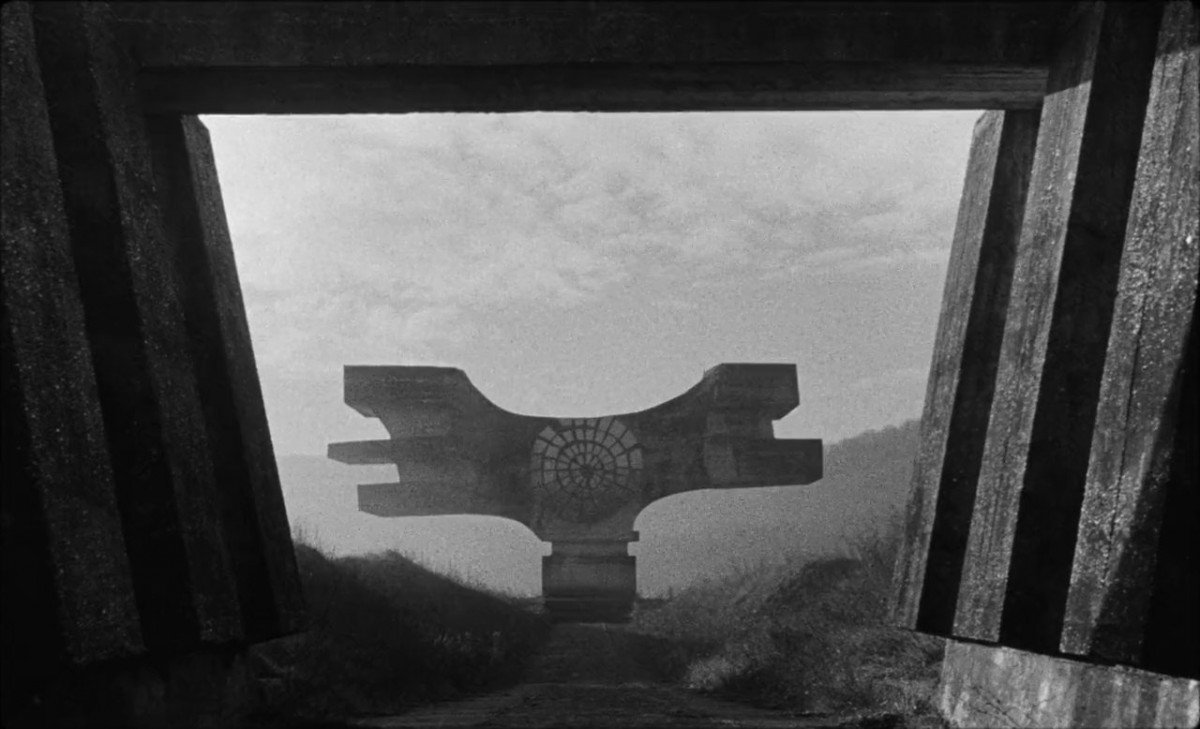FIRST AND LAST MEN
Directing: B
Acting: B+
Writing: B
Cinematography: A-
Editing: B
Last and First Men is like a cross between Stanley Kubrick’s 2001: A Space Odyssey and Fritz Lang’s Metropolis. It blends far-reaching futurism, black and white cinematography, and long, ethereal tracking shots of concrete architecture. Except in this case, instead of art deco, the structures onscreen are memorial structures still standing from the former Republic of Yugoslavia. These memorials were shot in what are now Croatia, Bosnia and Herzegovina, Serbia, Kosovo, and Montenegro.
And . . . visually speaking, that’s literally all it is. One black and white slow tracking shot after another, of these structures, clearly intended to evoke the notion of ruins of the future civilization described by the one performer in the film, Tilda Swinton, who serves as narrator. To her credit, her delivery is impeccable, and I could listen to her talk about anything in this mannered way, all day. Still, I’m glad the run time is only 70 minutes. With no action of any kind onscreen, this movie might just lull you to sleep. Many of the tracking shots go on so long that it doesn’t even matter. More than once I nodded off and when I came to again, it was still the same shot.
This film is receiving wide critical acclaim, and although I actually did enjoy it, I still take some issues with it. Far too much context is needed in order to appreciate it fully, which is always a pet peeve of mine. An astounding detail is that this cinematic art piece, which might be more at home in the Museum of Modern Art than in a theater, is presented as based on a novel—of the same name, by author Olaf Stapledon, first published in 1930. (Given that Metropolis the novel was published in 1925, and the film from which it was adapted also features black and white imagery of concrete structures, this brings the comparisons just short of coming full circle.) Last and First Men, the novel, tracks two billion years of human evolution, starting with the present version of humanity and spanning another seventeen successive human species.
To say this film, directed and co-written by Icelander Jóhann Gunnar Jóhannsson, pares down that insanely expansive premise is a grand understatement. The “story” as presented in the film is only ever revealed through Tilda Swinton’s narration, as though having been dictated by the last humans before cosmic annihilation, then sent back in time to our present day. Maybe to teach us about our future, maybe to give us the tools to help future generations, maybe both. How the exclusive footage of Eastern European memorial structures fits into that, exactly, is difficult to glean. It gives an air of long-dead civilization with just a few relics left behind, except in this scenario, wouldn’t these relics also have been annihilated?
Another darkly fascinating detail: Jóhann Gunnar Jóhannsson, up until this film, which was actually first released in Berlin in late February 2020, was a composer. This was his feature film directorial debut. As it happened, however, Jóhannsson died two years prior to that, to the month, in February 2018, apparently of a lethal combination of cocaine and flu medication. This means Last and First Men was both his debut and his last film, and that it should be such a broad—and, according to some, profound—rumination on existence itself is, in its way, astonishing.
I remain a little stuck on the premise, however. Maybe it’s just that people in 1930 had a lot easier time being optimistic about humanity’s long-term future, but two billion years? It actually makes sense for the span of time to be that long if it’s to encompass genuine evolution of species, but from the vantage point of 2022, it’s hard to imagine humanity surviving long enough to do any further evolving at all. Perhaps I should just think of this as yet another in a now-long list of “alternate reality” movies. Or, maybe I’m just not giving humanity enough credit: the narrator cites several things that affect the repeated rise and fall of civilizations, with climate change being among them. Perhaps believing that climate will truly render us extinct is excessively absolutist. We could be whittled down to next to nothing and still regrow our numbers.
Last and First Men challenges us to consider time on a scale far grander than most of us can truly wrap our heads around—the very thing that prevents theists from understanding how we could have ancestors who were fish. It does offer a great deal of food for thought, but it relies a little heavily on the thought portion, which is arguably tipping the scales too far for the visual medium of film. What this film has to offer is a pleasant enough experience, but left me wanting. The premise is far too epic in scope for there to be nothing epic whatsoever onscreen, exclusively in favor of otherworldly—if beautiful—shots of Slavic sculptures.
This means something. I just don’t know what!
Overall: B

